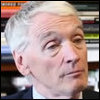Diaspora should mount independent legal campaign: Prof. Boyle
[TamilNet, Sunday, 08 November 2015, 23:18 GMT]
Pointing out that the United Nation's actions on Sri Lanka are unlikely to lead to establishing criminality for the Mu'l'livaaykkaal massacre on the State, Professor Francis Boyle, an expert in international law and who teaches at the College of Law, University of Illinois, advocates that the Tamil diaspora should organize a comprehensive legal campaign to bring charges in the International Court of Justice (ICJ), and in parallel, bring criminal and/or civil charges against Sri Lanka's genocidaires in the courts of the democracies of the West using domestic legal mechanisms underpinned by universal jurisdiction. Boyle asserted that genocide, crimes against humanity and war-crimes are international crimes that have no statute of limitations, and Rajapaksas can be subjected to legal actions for the rest of their lives like the Jewish people's hunt for the Nazis.
| Prof.Boyle's interview |
Professor Boyle in an interview given to a rights group based in Toronto, further explained his history of observations in Sri Lanka and compared the 2009 Mu'l'livaaykkaal killings to the Bosnian and Rwandan genocides. He also added that the latest UN report, while avoiding to mention "genocide," mentions names of the possible perpetrators of war-crimes which will be useful in future independent legal actions outside Sri Lanka.
Boyle maintained that the estimate of the number of Tamil civilians killed by the Sri Lankan state should be maintained as 146,000, a figure compiled by Catholic bishops who were present during the killings and who maintained records. Prof. Boyle added that the figures mentioned in the three UN reports of 40 to 70,000 were significantly underestimated.
Boyle said that the numbers killed in the final stages of the war while providing a sufficient basis to establish the two legal elements of genocide, the mental element ["intent to destroy in whole or in part of a group"] and the physical element [one or more of five possible acts, which includes "killing members of the group"], it will be useful to go back to 1948 to expose the clear pattern on intent. He noted that UN Zeid's report goes back to 1983 pogrom against Tamils.
When asked for comments on Prof. Boyle's advice, the spokesperson for Tamils Against Genocide [TAG], an US-based activist group that seeks legal redress for war-affected Tamils, said, "We fully agree with Prof. Boyle. Diaspora Tamils should exercise their legal option if the Tamils in the NorthEast are ever to get justice or legal redress.
"It's unfortunate that the leading Tamil party on the ground, the TNA, is admonishing the Tamils not to press for State criminality on genocide, arguing the available evidence is not sufficient. This is an untenable legal position for the following reasons: (a) the last phase of the war was a war-without-witness, and evidence of the mass atrocities are buried in the killing fields of Vanni. Only an independent investigation with modern forensic tools will expose the evidence and the extent of criminality, (b) seeking a charge of genocide will not foreclose reaching a verdict on other less culpable charges. Further, in criminal cases prosecutors routinely use this strategy, and (c) a large number of Tamils, including lawyers, and many other international activists believe that the crime in Mu'l'livaaykkaal was "genocide." One can argue that zealous advocacy for the victims by agile and competent lawyers in this case is to seek the highest level of culpability, "genocide."
"TAG believes that TNA may have a hidden motive to assist Sri Lanka (and the West) in whitewashing the genocidal crimes, and that Tamils should challenge the TNA, and mount a serious legal campaign charging Sri Lanka for the crime of genocide," TAG spokes person added.
Professor Boyle had earlier warned that the "Truth and Reconciliation process" as outlined in the the Office of the High Commissioner of Human Rights overview report on Sri Lanka, "does not work within the context of genocide," and that instead of a hybrid court recommended by the OISL there is a "need for an International Criminal Tribunal for Sri Lanka or else referral by the United Nations Security Council to the International Criminal Court." Boyle also warned that reforms by GOSL will not happen and that "[t]he Sinhala genocide against the Tamils will simply and predictably continue."

கருத்துகள் இல்லை:
கருத்துரையிடுக